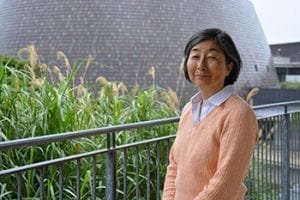News
Dilworth Becomes First VP for Gender Equality at OIST
What job could be so appealing that a person would come back to work from a well-earned retirement in Hawaii?
For Machi Dilworth, a former National Science Foundation official and current member of BTI’s Board of Directors and the Scientific Advisory Board, the opportunity to become the first Vice President for Gender Equality at Okinawa Institute of Science and Technology Graduate University (OIST), was too good to pass up.
After a 33-year-long career in Washington D.C. as a government research administrator – first at USDA and then at NSF—Dilworth had retired to the Big Island of Hawaii in 2012. But she relocated to Okinawa, Japan to begin her new position at OIST in April. The university opened in 2012 and since its inception has attempted to promote a diverse and family-friendly workplace.
“When all’s said and done, I think my sense of adventure got the better of me,” said Dilworth. “My career as a woman professional was helped by a number of terrific mentors, both men and women, and role models. I saw the position of VP for Gender Equality as an opportunity to give back what I received.”
Dilworth said that her own career coincided with the advancement of women scientists’ status in the U.S., as she rose to the position of Director of the Office of International Science and Engineering at NSF. She felt that her knowledge and experience could help women scientists who face steep barriers to career advancement in Japan. Additionally, while working as the head of NSF’s Tokyo office, Dilworth worked with Japanese women researchers on this issue. She sees the OIST position as an opportunity to continue working with Japanese colleagues who share the same vision.
“The work culture in Japan is not easy for women,” said Dilworth. “Women still bear the bulk of family responsibilities. Japan tends to value long hours spent at the office as a sign of commitment and dedication to work, which makes it difficult for women with family obligations.” Perhaps even more problematic are internalized stereotypes that can cause women to limit their own career options or not participate fully in the workforce, said Dilworth.
In her new position, Dilworth aims to increase the representation and advancement of women at all levels in the university and to create a work environment free of gender-based biases. She envisions a place where both men and women “can reach their full potential while maintaining proper work-life balance.”
Dilworth sees a lot of similarities between OIST and BTI—both are world-class research institutions that endeavor to have a positive impact on society.
“What I am learning in my new position is adding new perspectives and insights that I would think would help my contributions to discussions at the Board,” said Dilworth.
Subscribe to BTI's LabNotes Newsletter!
Contact:
Boyce Thompson Institute
533 Tower Rd.
Ithaca, NY 14853
607.254.1234
contact@btiscience.org
Copyright © 2023 | Boyce Thompson Institute | All rights reserved | Privacy Policy | Cookie Policy



